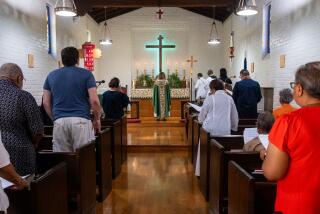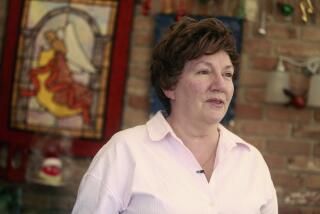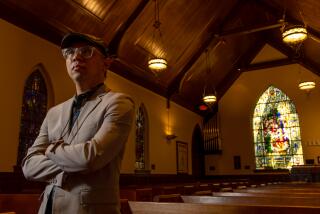After Seal Beach shooting, local churches adjust their services
It was offered as a prayer, but it was also a challenge.
“Jesus has told us to pray for our enemies,” the Rev. Tia Wildermuth told her congregation Sunday morning at First United Methodist Church of Seal Beach. “It’s hard to do, but let us pray for the man who did this, in the way that God calls us to do.”
The man to whom Wildermuth referred was Scott Dekraai, who is accused of killing eight people at a Seal Beach hair salon Wednesday. At United Methodist, as at other churches in Seal Beach, the tragedy was foremost in people’s minds as they sought answers from God for an act that, even their clergy admitted, seemed to defy human understanding.
Many in the church had some personal tie to the tragedy, which occurred a five-minute walk away on Pacific Coast Highway. Some send their children to the school attended by Dekraai’s son. And if congregants didn’t know one of the victims personally, many knew someone who did.
That made it especially hard to pray for the shooter, and some found themselves unable or unwilling to do so.
“I had difficulty with that,” admitted Ralph Rees, a retiree who has lived in Seal Beach for 12 years. He was among many who remained silent as some in the congregation chanted, “God, hear our prayer.”
“It’s not easy,” Wildermuth said after the service. “It’s not meant to be easy.” She said she knew that not everyone could join in the prayer, nor did she blame them.
“I realized, standing up there, that it’s easy for me because I didn’t know him and I didn’t know any of the victims,” she said. “But it’s who God calls us to be.”
This is the paradox of faith in a time of crisis. Those who believe in God turn to their faith when trouble calls — but they may also question it.
If police and paramedics were the first responders to the shooting at Salon Meritage, houses of worship were a close second. As a police chaplain, Pastor Don Shoemaker of Grace Community Church of Seal Beach was an early arrival to the scene Wednesday, and the rest of his week was consumed by the aftermath of the tragedy.
On Sunday, he scrapped his planned liturgy and had the congregation read responsively from Psalm 90: “You sweep men away in the sleep of death; they are like the new grass of the morning.…”
He delivered his sermon as photographs of the shooting victims were projected on a screen behind him. “From the depths of our hearts, we cry out, ‘Why, God, why?’ ” he said.
Shoemaker had no ready answers, only advice that the congregation pull together to support the families, co-workers and friends who were hit hardest by the loss.
The turnout for services at Grace Community was larger than usual, and several congregants rose to offer prayers or remembrances.
Mike Sosa, who works the graveyard shift as a security supervisor at the South Coast Plaza mall, said he was having trouble sleeping Wednesday, so he went for a bicycle ride. It took him past the hair salon just moments after the shooting.
His voice tight with emotion, he described the scene to his fellow congregants.
At first, he just wanted to find out what was going on, but those who knew were too hysterical to tell him. “In the far-off distance,” he said, “I heard what sounded like hundreds of sirens. It was almost like the city was crying.”
Eventually, he said, he learned what had happened. Overwhelmed, he left and began to ride home, only to ride by the scene of Dekraai’s arrest a few blocks away. It was almost too much for him to handle.
“I began to pray,” he said. “I asked God for understanding and peace, and it was given to me. He reminded me that this evil wasn’t caused by him, but … if we reach out to him in prayer, he will give us peace.”
Before Sosa was done, many were dabbing their eyes.
Neither Grace Community nor First United Methodist lost any congregants in the shooting. St. Anne’s Roman Catholic church lost two: Michele Fast and Lucia Kondas.
Sitting in his office in the rectory after morning Mass, Msgr. Michael Heher admitted that he, too, had no easy answers. “I don’t know why God makes us suffer,” he said, “but he does.” Jesus, he said, was well acquainted with pain and sorrow.
People feel helpless after such an event as the shooting, which could not reasonably have been predicted or prevented. The key, he said, is to fall back on community, something that is readily available in a small town like Seal Beach. “It’s a time to have each other when we’re feeling so fragile.”
If people are angry, that’s understandable, Heher said. “Forgiveness, I think, comes at the end of grief. It’s one of the fruits of grief,” he said. And it doesn’t come naturally.
“It’s not a reasonable thing to forgive,” Heher said. “It’s godlike.”
“Jesus,” he added, “says, ‘Turn the other cheek.’ But I think the cheek turns very slowly.”
mitchell.landsberg@latimes.com
More to Read
Start your day right
Sign up for Essential California for news, features and recommendations from the L.A. Times and beyond in your inbox six days a week.
You may occasionally receive promotional content from the Los Angeles Times.






